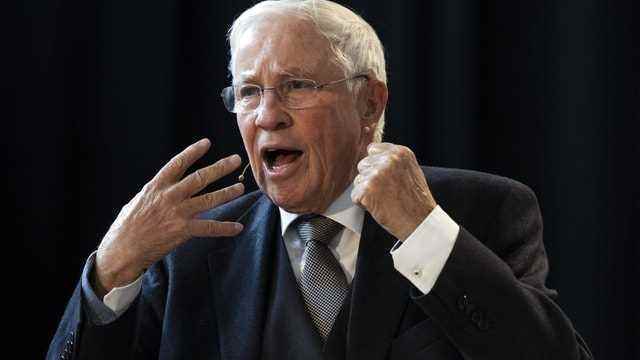contents
The FDFA would like to interpret neutrality less strictly. Former Federal Councilor Christoph Blocher wants to counteract this.
After the Russian attack on Ukraine, the Federal Council found it difficult to find a clear line. True, he immediately condemned the Russian aggression; However, he initially did not want to accept the EU sanctions against Russia with reference to neutrality. After a few days and a lot of criticism, the change of position came. Since then, Switzerland has supported the sanctions.
This fits with a fundamental finding that can be found in the foreign department’s neutrality report:
Partner states struggle to understand the meaning and purpose of a neutral position.
This lack of understanding was demonstrated again just recently when Switzerland had trouble with the question of whether and which Ukrainian war wounded it wanted to take in.
acceptance problems abroad
Oliver Diggelmann, Professor of International and Constitutional Law at the University of Zurich, agrees that Swiss neutrality is currently having a problem with acceptance – especially in Western and democratic countries. Because Swiss politics is often perceived as lacking credibility and lacking in straight lines.
“It’s tricky for neutrals when they export weapons on a large scale that eventually turn up in war zones,” says Diggelmann. It is just as tricky to profit from the economic failures of sanctioning states. “We are still too much suspected of profiteering from crises and wars.”
EDA promotes “cooperative neutrality”
The Department of Foreign Affairs, led by President Ignazio Cassis, outlines a way in which Swiss politics could find more acceptance again. The buzzword is “cooperative neutrality”.
And in the still unpublished neutrality report, this is also specified:
Switzerland is increasingly coordinating with the EU or NATO while complying with the law of neutrality.
It should also be possible for the Swiss army to take part in NATO exercises or for exercises to take place on Swiss soil. This cooperation is also in Swiss security interests.
Strong resistance comes from SVP politician Christoph Blocher. Blocher insists that NATO cannot be a partner of Switzerland, and says in his usual sharp-tongued manner: “There must be no joint maneuvers with NATO. Because if you make joint maneuvers, you also wage war together.”
Blocher is convinced: With such provisions, the Federal Council would no longer falter as it does now with the Ukraine war: “It makes a great impression all over the world when a government says: I can’t help it – our constitution, of the people and the cantons approved, don’t want us to become a war party. We are for perpetual, armed, comprehensive neutrality.”
Hot autumn is coming
Neutrality requires a certain restraint, and international law expert Diggelmann agrees. Nevertheless, the planned initiative goes too far for him. Because in today’s world one should not ignore a reality: “The EU is not only our most important trading partner and a gigantic peace project. In terms of peace policy, it is also our partner in spirit.» Swiss foreign policy must take this into account.
The debate about Swiss neutrality will soon gain momentum: in August, the Federal Council is to officially adopt the neutrality report – with certain changes if necessary. And Blocher’s neutrality initiative is to be launched in the fall. He is already looking for comrades-in-arms outside of his own political camp.
